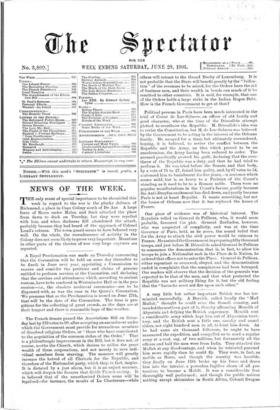One piece of evidence was of historical interest. The Royalists
relied on General de Pellieux, who, it would seem probable, favoured the plot. General Zurlinden, however, who was suspected of complicity, and was at the time Governor of Paris, held, as he avers, the sound belief that for the Army to attack the civil power would be ruinous to France. He assisted the Government in preparing fif ty thousand troops, and just before M. Deroulede asked General de Pellieux to commence the demonstration, that is, in fact, to allow his troops to join a Nationalist mob in the Place de la Nation, he ordered that officer not to enter the Place. General de Pellieux, either repentant or overawed, obeyed, and the demonstration ended in complaints that the conspirators had been betrayed. Our readers will observe that the decision of the generals was expected to be that of the men, and that what protected the Republic was not military liking for it, but the old feeling that the "barracks must not fire upon each other."




















































